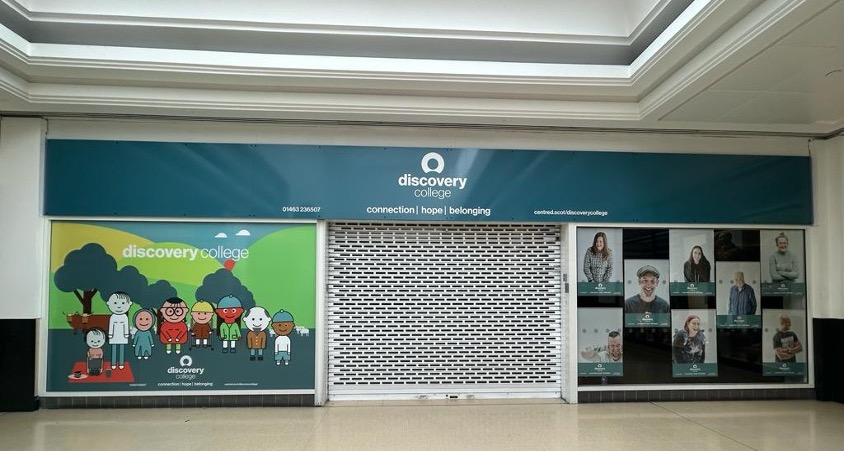
Our latest Meet the Partner series continues with June Jeffrey, Head of Health and Social Care Community Services at Centred. With around 150 staff and working across the entire Highland region, the charity helps people with mental ill-health who live in their own homes and in Centred’s Recovery Centre in Inverness.
What does Centred do, and what is its ethos?
We work with adults who are experiencing mental ill-health and, in some cases, additional issues that impact on their ability to live a meaningful and fulfilling lives. We are a progressive charity, and continue to maintain a position at the leading edge of mental health recovery within the Highlands of Scotland.
We work within the Recovery ethos, which supports people to live productive lives even if symptoms persist. We have a 23-bed Recovery Centre in Inverness, which provides support to supported people in 12 self-contained flats and 11 single rooms. The Recovery Centre was the first facility of this kind in Scotland.
In the community we provide Support and Care at Home services to people living in their own homes within local environs from Inverness, Invergordon, Lochaber and Caithness. Within the Inverness and Easter Ross services we also facilitate supported accommodation services covering 24 hours each day 7 days each week.
How did Centred get started?
It was founded as Birchwood Highland 1987, to support the closure of Craig Dunain – one of the old-fashioned asylums outside of Inverness. The Community Care Act was looking to close these huge institutions located on the outskirts of towns and cities across Britain. The Not for Profit organisation was founded as a response to this government legislation. We started as a community-based service, moving people that had spent lots of their adult life – if not all of their adult life – in old-fashioned asylums, and moving them back into properties in the Inverness area where they could be supported in a more homelyand person-centred way aimed at enabling them to become part of their own communities.
We quickly realised how big the Highland area is! And how far people had travelled to Craig Dunain. When they were leaving, they wanted to go back to areas that they were more familiar with and may have some family connections. In response, we opened a service in Easter Ross, and then one in Lochaber.
We also opened Birchwood House at that time, which was set up to offer people who still needed 24-hour care and support with the added skills and knowledge provided by qualified nursing staff. The hope was that either they would later be able to move on to supported accommodation, or if not that they would be able to live there, but in a much smaller, more person-focused environment than the big institution. Birchwood House was updated and reopened in 2017 as The Recovery Centre, offering the opportunity for people to work toward their own personal goals by managing the symptoms they may be experiencing.
Now, we also work in Caithness offering both Support Services and Care at Home to people living in the County. We cover a huge area of the Highlands, but there are still a few gaps, just because of the size and geography of the Highlands. We continue to lobby for equality of access to services.
How do people come to you these days?
In Highland it’s a bit different from other areas: adult services are commissioned by NHS Highland, they are our biggest commissioners of services.
It’s usually either because someone has been or is being discharged from hospital and will need ongoing support to live as independently as possible at home. People and families come to their notice for other reasons, not necessarily just through hospital. So social work often make referrals directly.
The Highlands area is exceptionally large and sparsely populated. How does that affect the way that you work?
As a service, we have to realise that people do live quite isolated lives, and access to services is hugely challenging. Over the years, living in these communities has actually become even more of a challenge, especially right now due to the cost of living crisis. Having supported staff and people using our services through covid – further isolating people – we now face the cost of living crisis. And, of course, accessing services in the Highlands comes at an additional cost.
The cost of providing services in remote areas is not really considered by Scottish Government and therefore our commissioners.
Can technology be part of the solution, now or in the future?
It is right now. A big project at the moment is to reach out to people in the community and find ways of how to support them, whether that be on a one-to-one basis in their own home, or as part of group, or using new technology. I guess one of the positives from covid was that we all got used to communicating using Zoom and Teams and those types of things.
NHS, of course, use a lot of these technologies for appointments, especially in remote areas. However, that does have challenges about internet access and the cost of that. It’s certainly becoming a preferred way for younger people. They have their mobile phones, but a small screen can be a challenge for older people.
What projects are you currently working on?
We’ve recently opened a Discovery College, which works with people in the community. (Not necessarily people who have been commissioned for support, but people that are out there and don’t know where to go, or how to access services.)
People will be able to drop in and see who we are and what we’re about, and they can work on their own objectives. We’ll provide some learning courses that will be certificated, but over and above that there’ll be help to prevent isolation. Being able to come along and have a chat and a cup of tea with people who are peers. We have three Peer Support Workers who all have lived experience.

What sorts of mental health problems are experienced by the people you work with?
The full range. However, people who have been referred through NHS partners tend to live with significant mental ill-health: schizophrenia, personality disorder, bipolar…. but I think that what’s missing there are people who have anxiety and depression and just live with it. They never come to notice of services. The aim of the Discovery College is for people to reach out and find us.
Does someone’s location affect their likelihood of experiencing mental health problems: do they occur more in cities and less in rural areas, or vice versa?
It’s probably impossible to say, because people who live in cities have access to more services, so they’re more likely to come to the notice of those services.
And looking at it the other way, the outcome of people living with mental ill-health, or trauma, or any of these type of challenges, is that they have less life opportunities and therefore often end up in areas of deprivation and poverty. So, I think it works both ways.
How did your connection with Future Pathways come about?
I got a call from Future Pathways last year. You were looking for a provider to work with a particular individual that was being supported by staff based outside the Highland area. The individual was then offered a number of services in the area, and chose Centred as their preferred support provider.
The person, very fortunately, lives centrally and close to services. So we were able to provide support reasonably quickly, without anyone having to do lots of travelling.
Since then we’ve become an approved provider. There’s a lot of information that’s needed! All our staff are trained, and we’re fully insured. We’re registered with the Care Inspectorate, all our workers are SSSC-registered.
We’re really looking forward to working more with Future Pathways, and hopefully across the Highlands. Inverness is the main hub of need, but don’t forget that we are available to provide support from Caithness to Lochaber.



